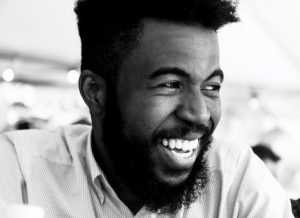 It takes a special kind of person to be able to create poetry, to entice listeners and have them wrapped up in every word. But it also takes a special kind of person to use words as a platform to help others and spread knowledge.
It takes a special kind of person to be able to create poetry, to entice listeners and have them wrapped up in every word. But it also takes a special kind of person to use words as a platform to help others and spread knowledge.
That’s what Joshua Bennett does, and has been doing since the age of 4, if you let his mom tell the story. Bennett recalled coming home from church, and re-creating sermons on a regular basis.
“I knew since I was very young that I just believed in the power of both my writing and performance, and those two things are separate, but necessarily connected,” Bennett said. “We’re a complex people that have always went across genre, across time, and we supported each other and kept each other afloat.”
Bennett, an NAACP Image Award nominee and current assistant professor of English and creative writing at Dartmouth College, will close out Week Five, “The Life of the Spoken Word,” at 10:45 a.m. today in the Amphitheater.
Since his performance at the White House in 2009, Bennett has been touring across the world — that’s 10 years of impacting people with his words.
“It’s been a real blessing, and that’s been the journey of my life,” he said.
In this field, Bennett had to become his own role model, not only professionally, but in the life he’s living as a whole.
“I don’t really know of many people that are sort of poets publishing books, poets that perform, and then people that are literary critics. … I actually have maybe three very distinct careers that are all happening at the same time,” he said.
As his own role model, Bennett published his first poetry book, Algorithm and Blues in 2014, and his second book, The Sobbing School in 2016. He has two more books coming out in 2020, Owed and Being Property Once Myself: Blackness and the End of Man. Bennett describes Owed as “a book about reparation, … the long-standing fight in African American culture for physical reparations from the government, … but also reparation as a cultural practice. How do we feel? How do we repair bonds that have been broken?”
Being Property Once Myself stems from Bennett’s 2016 Princeton University dissertation, which was “largely about animal figures in African American literature, how black people have historically written about their relationship with the animal world and the midst of a world that starts to animalize them, to dehumanize them.”
“How then are black people able to conceive a relationship with the animals, but also the natural world in ways that you wouldn’t expect?” Bennett said.
Along with those two books, he has another book forthcoming in 2021, Spoken Word: A Cultural History. And while things are working out for Bennett, it took years to get to this point. Getting into these professional creative spaces hasn’t been the easiest, but Bennett has experience navigating in professional spaces that don’t always represent him.
Growing up in South Yonkers, New York, he received an academic scholarship at the age of 14 to attend “an elite, largely white private school two hours away from my home … with the children of millionaires and billionaires.” He took that journey — those two buses and a train — every day, and it was in those moments where he made a promise to himself.
“Ever since that time, I have to reckon what it meant to have my honest, black identity, to have my life as someone who was raised in the black church, around … working-class people, black people with dignity and with love and with care,” Bennett said. “I would never lie about who I was or what I was there to do. I was never going to diminish the light of my blackness at any point.”
Bennett’s lecture today holds the same title as his forthcoming book and will explore “a dynamic living, complex history of this form.”
“A lot of what I’m trying to actually recover in my writing on spoken word was a particular time for the black and Puerto Rican writers, organizers, teachers, activists in the late ’60s and early ’70s who were thinking about spoken word as an instrument of radical social change,” he said. “It’s really a hybrid kind of performance lecture of both my historical analysis of spoken word as a literary phenomenon … but also my own experience as a writer, an educator, as a thinker that was molded by this tradition, and is trying to carry it forward into the future.”
Bennett spoke with The Daily ahead of his lecture to share his life, work, and what we can expect. Listen to the interview below.




